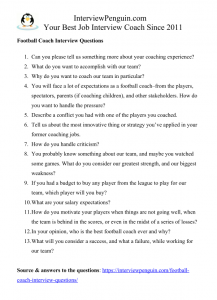Passion for some, full time employment for others, and a Saturday’s afternoon activity for billions of TV watchers all around the globe. Football is a phenomenon. And it doesn’t matter whether we speak about European or American football.
When billions watch, and pay for watching something, there’s always a lot of money on the table. You can have your fraction of a pie working as a coach.
Certainly, you won’t earn as much as Vince Lombardi or Jose Mourinho, at least not at the beginning of your career. You won’t start like a superstar. But you can earn a nice monthly income, do what you love, and who knows what happens in ten years from now? Sky is the limit for the best football coaches.
Let’s have a look at some questions you may face while interviewing for a job of a football coach. I focus more on the European version (read soccer if you’re from the US), just because I understand it better. However, the questions will be very similar when you apply for a position of a coach in American football. Let’s start!
Table of Contents
Can you please tell us something more about your coaching experience?
This is the most important question in the interviews. Experience matters, and if you manage to narrate the details of your experience in a right way, it can win you a job contract.
I suggest you to make a simple work portfolio. Include each coaching role you had, and try to describe the following, either in short sentences, or in bullet points:
- The position of a team when you became a coach–how well (or badly) they were doing in their league, that’s the most important thing, but also some internal problems they had, etc.
- Goals you set for yourself as a coach (or your employer set the goals), that means for example to win the competition, or not fall out of the league, or perhaps to get new payers onboard, change the playing style, etc.
- The strategy you applied while trying to reach your goals. This can include acquisitions of new players, changing of tactics, working on physical or mental condition of your players, and so on.
- Whether you achieved the goal, and if you didn’t, why. Here it is important to identify the mistakes and accept the responsibility for the final result of the team.
Narrating your experience in this way, you show your prospective employer that you have system in your work, set goals, and have a knowledge of basic coaching principles and strategies. Of course, if you achieved something big with one of your teams, it’s a big plus in every interview.
What to say if you have no coaching experience?
If you haven’t coached anyone before, you should talk about an experience of a player. Certainly you had your coaches, and you learned a great deal from them. You can even narrate one such experience, telling them what a coach did or changed in XYZ team for which you played back in the day, and how it impacted the results of the team.
When you lack experience, the most important thing is to show that you do not lack courage, and believe in your coaching abilities…
What do you want to accomplish with our team?
Be ambitious, at least in an interview. If they finished 10th in the last season, do not say that you want to manage the same feat. Aim higher. Maybe your new team doesn’t have a great budget, but you still want to finish at least no. 7 or no. 8, and who knows what will happen next season?
Of course, if you are entering the “game” in a specific situation, such as that they lost the last ten games and they fired their existing coach and you are a last minute replacement, etc, you should adjust your goals to the situation–to stabilize the team, to improve the morale, to change something, etc.
Why do you want to coach our team in particular?
It is important that you do your homework. You shouldn’t say that you want to coach them just because you live in the same city, and it will be convenient for you to travel to work. Try to come up with something better.
One option is your loyalty to their team, club, whatever. You’ve been always a fan, you’ve been supporting them, know their players, branding, past successes and failures. Why would you opt for coaching any other team?
Another option is referring to something about their players, or the potential of the club. You did your homework, you watched a few matches, and you know that they can achieve a lot as a team–with the right coach on board. And especially if they are not doing well right now, you see it as an opportunity to demonstrate your coaching skills. You like challenges, and this is the one…
If you are applying for a job of a football coach in a small team, or with small kids, then you can simply say that at this stage of your professional career (maybe your first coaching job), you’ll be grateful for every opportunity. At the end of the day, you can achieve great things with any team, just you won’t be in the spotlight with this one.
Special Tip: Download all questions in a one page long PDF, and practice your interview answers anytime later:
You will face a lot of expectations as a football coach–from the players, spectators, parents (if coaching children), and other stakeholders. How do you want to handle the pressure?
Ensure the interviewers that you are aware of the pressure. You won’t run to the lockers or quit your job when one of the spectators throws a plastic glass with beer in your direction, or when the fans are yelling that you should leave their team.
Such things simply belong to football, and the spectators, or the parents of the players, see just a small fraction of the entire picture. They know nothing about your coaching strategy, goals you have on your mind. They do not see what’s going on in the locker rooms and in the heads of the players.
Hence you will take it as it is–and will focus on your job. You won’t change something just because some fans are telling you to do so. You will stick to the plan, work with the players, and ignore any negative remarks from people who do not understand the job of a football coach. Or at least you won’t take them personally. That’s your way of dealing with pressure.
Of course, situation changes when you apply for work in a big club, there’s media attention and everything. But I do not think you’d be reading this article if that was the case :)…
Describe a conflict you had with one of the players you coached.
The attitude you show is more important than the situation you narrate. One thing you cannot afford as a football coach is losing the respect of your players. If it happens, you are finished and can start looking for a new team.
On the other hand, if you were leading a team with a despotic style, never listening to your players, you’d hardly achieve any results with them. Football players are human beings–they like to be respected, heard out, recognized…
Try to talk about a constructive conflict you had with the player. Maybe they suggested some changes to the strategy, or they weren’t happy with their position in the team. You listened to them patiently, because feedback from players is important for you, then you explained them your point of view, and eventually you came to an agreement.
Other questions you may face in your interview for a job of a football coach
- Tell us about the most innovative thing or strategy you’ve applied in your former coaching jobs.
- How do you handle criticism?
- You probably know something about our team, and maybe you watched some games. What do you consider our greatest strength, and our biggest weakness?
- If you had a budget to buy any player from the league to play for our team, which player will you buy?
- What are your salary expectations?
- How do you motivate your players when things are not going well, when the team is behind in the scores, or even in the midst of a series of losses?
- In your opinion, who is the best football coach ever and why?
- What will you consider a success, and what a failure, while working for our team?
Conclusion, next step
Interview for a job of a football coach belongs to tricky job interviews. It’s not easy to tell exactly what questions they will ask you, because it depends a lot on the person who leads the interview with you–it can be a manager or club owner who has no experience with recruitment or interviewing for jobs…
However, they will always ask about your experience, and that’s why you should prepare a short portfolio or presentation, which will help you demonstrate the successes you achieved with the teams you coached before, or the lessons you learned when you failed to succeed.
Try to prepare also a short answer to other questions from this articles (you will for sure face at least some of them), and do your homework. Learn as much as you an about the club and the team, the players, the former coaches, about their history. This will help you to connect with your interviewers, and to come up with right answers to certain questions…
I wish you good luck!
May also help you prepare for your coaching interview:


